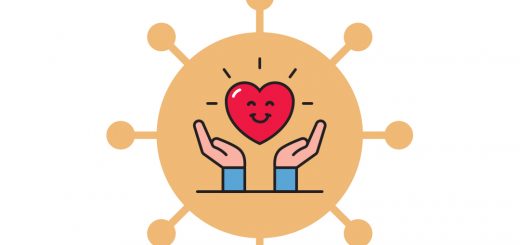Mind, Body… and Sanitiser
Our world as we knew it has temporarily changed, and we have had to adjust pretty quickly. What we used to do to relax and let off steam is now limited to how fun you can make your walk round the block or thinking ‘I wonder if I should download TikTok…’
But there is more we can do to keep our minds and bodies healthy. The first blog about how to adjust to working from home hinted that we might need to think about how we build exercise into our new routine. Again, possibly a bit more challenging when our sports clubs and gyms are closed down but this is still manageable!
The wide range of health and fitness content online, usually available to stream at your leisure, does mean there is something for most of us.
Weekly online yoga classes to join in with
When our campus was open we offered a range of activities to staff and students and whilst some of this has had to cease we are delighted that Maureen Thorpe and Laura Gonzalez, our staff yoga teachers, have given us access to weekly online yoga classes. Check your inbox for more info from the Wellbeing Forum on how to join up.
Exercising at home
We all have different needs when it comes to exercise and you may be attempting to try new things in your homes, with limited kit and space. We can’t all do burpees or planks so there are links below to some online content that is free and for all levels of fitness and mobility.
Resources online:
- NHS One You – Home Workout Videos
- Freshly Centred Pilates Videos – a range of videos starting from just 10 minutes long and covering pregnancy and post-natal Pilates.
- Disability Horizons – Top 10 exercises for disabled people
- Exercising with limited mobility
The sun is shining!
The weather has been extremely kind to us lately and we hope you’ll be able to get outdoors and enjoy exploring your local neighbourhoods on foot during your permitted daily exercise. The fresh air and some vitamin D can have a positive impact on both mental and physical health.
Good mental health
In times of stress, our minds and bodies are wired to respond and in a global crisis, this can mean that even if you have generally good mental health normally, you might be facing some new challenges. For those in our neurodivergent community or with pre-existing mental ill health, this situation could be particularly troubling.
It’s important to stay informed and aware of safety precautions and advice, but it should be on your own terms. Step away from the TV or put down your phone if you start feeling overwhelmed. If anxiety is an ongoing issue, consider limiting how often you access information.
Some advice for navigating online over the coming weeks:
- Limit how often you check for information and only rely on reputable sources such as the NHS or the World Health Organisation for example.
- Be wary of sensationalist headlines and ‘fake news’ – even well-meaning friends can unwittingly share content that is inaccurate and often alarmist.
- If social media is an issue, consider deleting any apps where information is regularly posted, skipping the posts which feature the ‘C’ word or hiding that friend whose timeline features conspiracy theories or dubious homemade cures. You can also mute words on Twitter so you won’t see those posts pop up!
- If you find it hard to stop once you start reading online, have a trusted friend do it for you and provide a condensed update – again using only reliable sources.
For more information, Mind.org.uk and SAMH have some excellent resources focused on Coronavirus and your wellbeing.
For those of you who are or have family or friends who are neurodiverse, and are finding it difficult to adjust at a time when everything we know has changed Roz Caplan, Conservatoire Equality and Diversity Officer has reviewed some specific guidance:
- Oxford University – Coronavirus information for staff with pre-existing mental health conditions and for those in the neurodivergent community with some great links to reputable resources
- OCD and Coronavirus survival tips – a brilliant article about hand washing for anyone with OCD, germ or health related anxiety and anyone finding that they’ve become very stressed about keeping their hands clean at this time.
- OCD and Coronavirus – Blog post by Ashley Fulwood Chief Exec of OCD UK, a great insight into how this situation can impact existing conditions.
- COVID and Asperger’s – Alex Manners blogs about living with Covid-19 and Asperger’s
Your usual resources are still available…
As a student or staff member the resources that you can usually access are all still available remotely and will have specific COVID-19 resources. There are links below to remind you how to reach the services.
- Our staff employee assistance programme, Workplace Options is available to all RCS employees and offers support, advice & assistance with specific COVID-19 resources available.
- Big White Wall – The online supportive community, s available 24/7 – sign in with your RCS email address.
- Student Counselling;
- The RCS Counselling Service will be accessible through email. Please contact Dr Jane Balmforth on balmforth@rcs.ac.uk to arrange an online appointment or request information.
- Students can also arrange telephone counselling by contacting Mairi Gillies, Cognitive Behavioural (CBT) therapist at mairi@mgtherapy.co.uk
- Ross Paterson, the counsellor who is available weekday evenings -5-8pm on westendcommunitycounselling@gmail.com
- Stephanie McDermid provides counselling in BSL and online counselling on stephanier1975@btinternet.com
Acknowledge your thoughts and feelings and be kind to yourself at this time. It is normal not to feel ‘normal’. We all spend so much time rushing through life and defining ourselves through our work, hobbies and passions that it feels odd to simply just be. Right now it’s the best thing we can do.



